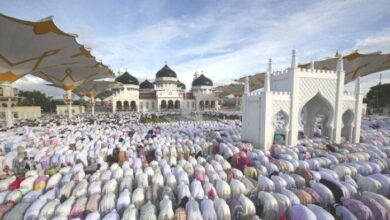
Sacrificial worship is a worship that is carried out once a year, to be precise on the 10th of Dzulhijjah, both for those who make the pilgrimage and those who do not perform the pilgrimage. Apart from that date, the sacrifice can also be carried out on Tasyrik day, namely on the 11th, 12th and 13th of Dzulhijjah or three days after Eid al-Adha.
For pilgrims who carry out two of the 3 practices on 10 Dzulhijjah, namely throwing the jumrah aqabah, cutting the sacrificial animal, and shaving their hair (afdhal spends it) then tahallul awwal, meaning that pilgrims are allowed to return to wearing ordinary cloth and there is no prohibition on ihram anymore except marital relationship.
Animals that can be sacrificed are cattle, camels, buffalo, goats or sheep. While the law of sacrifice itself is divided into two opinions. There are scholars who say that sacrificing is obligatory as stated in QS Al-Kautsar verse 2. However, the majority of scholars are of the opinion that it is sunnah muakkad, or sunnah that is highly recommended to be done.
Among the virtues of sacrifice are:
1. Worship that Allah SWT loves more during Eid al-Adha.
2. When the Day of Resurrection comes, the animal that has been sacrificed will come completely physically and become a reward value.
3. Sacrificing on Eid al-Adha (10 Dzulhijjah) or Tasyrik days (11, 12, 13 Dzulhijjah) is a way to get closer to Allah SWT.
4. As a way to train oneself to be willing to broaden one's heart or be sincere in making sacrifices, to train to eliminate selfishness, stinginess, individualism, and to form a Muslim person who has a social spirit.
5. Means to be grateful for the blessings of Allah SWT and become a step to achieve His pleasure.
Hopefully we can carry out the main practices on 10 Dzulhijjah, namely pilgrimage and/or sacrifice.
25 Dzulqaidah 1444 H / 14 June 2023. (AFQ)



